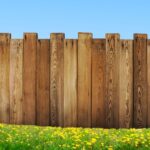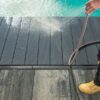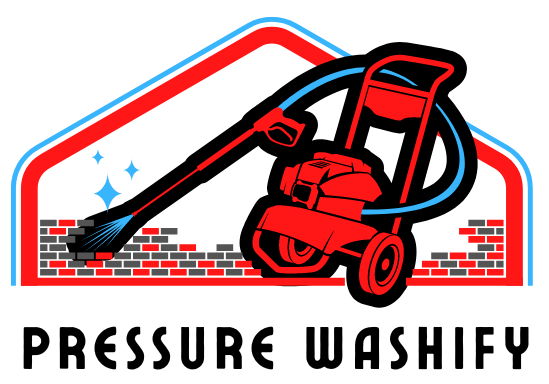Affiliate Disclaimer: This post may contain affiliate links, meaning we get a commission if you decide to make a purchase through our links, at no extra cost to you.
Let’s be honest, we’ve all looked at our garage floor at some point and thought, “Oof! I should really give this a scrub.” But then considerations like logistics, time, and the lack of a pressure washer often get in the way. Guess what? Cleaning your garage floor doesn’t have to be a monumental, equipment-heavy task. In fact, it can be done just as effectively without a pressure washer.
Now, you might be thinking, “Surely, it can’t be that easy!” Oh, but it is, and we’re here to guide you through it. In this all-inclusive guide to how to clean a garage floor without a pressure washer, we’re ready to debunk the myth that you need heavy-duty equipment for efficient garage floor cleaning.
Prepping Your Garage Floor
Before we start the actual cleaning, it’s essential to prepare your garage floor.
Step 1: Clear the Clutter
First things first – time to deal with that clutter! This might seem evident in theory, but it can be surprisingly arduous in practice. Fun as it is to navigate between the push mower, your child’s bike, or that half-assembled DIY project, it’s cleaner and safer to remove everything from your garage floor before beginning to clean.
If your garage houses a lot of items, consider categorizing them into different groups like ‘Tools’, ‘Sporting Equipment’, ‘Holiday Decorations’, etc. This won’t just facilitate the cleaning process but also help you reorganize your garage more efficiently afterward.

Step 2: Sweep Up Loose Dirt and Dust
With the area cleared, it’s time to bust out the broom or shop vac. Sweep every nook and corner of your garage for loose dirt, dust, leaves, and other debris. If you use a shop vac, make sure you efficiently vacuum up the dust to prevent it from flying around the garage. This cleaning operation prepares the floor for your chosen cleaning solution, allowing it to work directly on the stains and grime embedded in the floor, rather than the top layer of dust.
You’d be surprised at how much cleaner your garage floor looks after just these two stages.
DIY Cleaning Solutions
Here are three of the most reliable and effective DIY cleaning solutions that you can whip up in a jiffy.
Option 1: Warm Water and Soap
Sometimes, the simplest option works like a charm. Believe it or not, a bucket filled with warm water and a generous squirt of your regular dish soap can do wonders for light to moderately dirty floors.
Get yourself a long-handled scrub brush or an old towel with a good grip, dip it in the soap solution, and scrub away! It’s an excellent option for general cleaning without chemicals, and it’s safe, eco-friendly, and easy on your wallet.
Option 2: Baking Soda and Vinegar
Got some tougher stains on your garage floor? No need to fret! Good old baking soda and vinegar to the rescue. Mix equal parts baking soda and white vinegar to create a slightly thick paste. Apply this paste directly onto the stains and let it sit for 15-20 minutes.
Afterward, grab a stiff-bristled scrub brush and scrub the stained area. The paste’s fizzing action will help to dissolve stubborn stains and leave your floor looking fresh and clean. Rinse with water and watch those stains disappear! Just like the soap solution, this method is environmentally friendly and gentle on your budget.

Option 3: Degreasing Cleaners
If you’re dealing with heavier oil or grease stains, it’s time to break out the big guns. A degreasing cleaner like Simple Green, Krud Kutter, or Zep Heavy-Duty Citrus Degreaser will make your battle against stubborn grime easier.
Mix the degreaser according to the instructions on the bottle, and apply it to the stained area. Depending on the severity of the stain, you may need to let it sit for a while before scrubbing. With a stiff scrub brush, scrub the area and rinse thoroughly with water once done. Voilà! Your garage floor should now be free of those pesky, slippery stains.
Enjoy a Spotless, Grease-Free Garage Floor with Zep Heavy-Duty Citrus Degreaser
For those deep-set, difficult stains we mentioned earlier, we’ve found an extremely efficient solution for you: the Zep Heavy-Duty Citrus Degreaser.
This heavy-duty degreaser is highly recommended for its cleaning power to remove even the hardest grease and grime stains.
Key Features:
- Formulation: Unique blend with a natural citrus solvent that embodies professional strength grade to tackle hardened grease.
- Versatility: Not just for your garage floor! This degreaser also works wonders on appliances, grills, stovetops, concrete, tools, engines, fiberglass, aluminum, stainless steel, and kitchen surfaces.
- Safe Usage: Though it’s powerful on stains, it is safe to use on various surfaces. However, do note that it is not recommended for use on glass, acrylic glass, plastics, auto paint, leather, or natural stone surfaces.
Remember, a clean garage floor is more than just a spotless surface—it’s also a safety measure to prevent accidental slips or falls. With the Zep Heavy-Duty Citrus Degreaser, you can maintain your garage floor in tip-top shape and cleanliness year-round!
Following our guide and combining it with this effective product will surely give you a garage floor that doesn’t just look good, but feels good to step on too!
How To Clean Garage Floor Without Pressure Washer: Techniques and Steps
Applying Your Chosen Solution
Start by wetting the floor with a little water – just enough to dampen it, not flood it. Next, apply your chosen cleaning solution over the entire garage floor. The warm soapy water or DIY paste can be applied generously, and remember, if you’ve chosen to go with a degreasing cleaner, follow the instructions carefully regarding application and dilution.
Once your solution is spread out, let it sit for a few minutes to work its magic!
Time to Scrub

Bring out your scrub brush, and let the scrubbing games begin! Make sure you scrub thoroughly, paying extra attention to heavily stained areas. We won’t lie, this might take some elbow grease. But think about the satisfaction you’ll feel when looking at the floor after.
In case of stubborn stains that won’t lift after the first round of scrubbing, don’t worry! Simply apply some more cleaning solution to the spot, let it sit, and scrub again. Persistence will pay off!
Rinsing and Drying
With the scrubbing done, it’s time to wash off the tired soap and grime. Using a garden hose, rinse your floor carefully ensuring all the cleaning solution is thoroughly rinsed away. Start from the furthest corner of the garage floor and work your way to the garage door for the best results.
Next comes drying. Mop up the extra water with clean, absorbent towels or if weather permits, let the floor air dry with the garage door open. You want your garage floor to be totally dry before you bring your items back in.
Maintaining Your Garage Floor’s Cleanliness
Now that you know how to clean your garage floor without a pressure washer, it’s time to learn some valuable tips to maintain it. After all, a clean garage is not just a one-time event; it’s a continuous commitment.
Regular Cleaning Schedule
The key to a perpetually clean garage floor is establishing a regular cleaning schedule. By attending to your garage more frequently, you can prevent the buildup of grime, dust, and debris. Depending on the usage of your garage, you may need to sweep and mop the floor weekly or monthly.
For a deep clean like the one detailed above, consider doing it twice a year or seasonally to maintain that pristine look. By doing so, your garage will not only look great but also be a safer place for you and your family.
Preventative Measures
There are several simple measures you can take to give your garage floor an extra layer of protection and prevent future staining.
- Seal your concrete floor: Applying a concrete sealer can help protect your floor from absorbing liquids that can turn into stains. A sealed floor will make subsequent cleaning sessions easier, as dirt, stains, and liquids won’t penetrate the surface. Consult with a professional or DIY it – there are a variety of sealing products available on the market.
- Place floor mats: Strategic placement of floor mats is a game-changer. Cover high-traffic areas or park your car on a specialized mat. These mats protect your floor against oil and other stains. When they get dirty, simply take them outside, hose them down, and let them dry before placing them back.
- Stay vigilant: Accidents happen, but cleaning spills immediately can save you from frustrating stains down the line. Whether it’s oil leakage from a car or a spilled can of paint, the faster you react, the less chance there is for the spill to become a permanent resident on your garage floor.
Wrapping Up

Cleaning your garage floor without a pressure washer is not just doable—it’s incredibly feasible and environmentally friendly too!
Armed with your homemade cleaning solutions and a dash of elbow grease, even the toughest stains don’t stand a chance. Plus, with the maintenance tips we shared, you can keep your showroom-quality floor for a long, long time.
Remember, cleanliness extends beyond the living room and kitchen; it’s a lifestyle. And starting with the garage—a space rarely acknowledged in cleaning sprees—can set the pace for maintaining the entire home. So take that first step, get into your garage, and bring on the transformation.
After all, as the saying goes, cleanliness is next to godliness! So, here’s to a cleaner, more organized, and godlier garage!
Frequently Asked Questions
Can I use a homemade degreaser for cleaning my garage floor?
Yes, you can create a homemade degreasing solution by mixing equal parts white vinegar and water, then adding a few drops of dish soap. While it might not be as strong as a commercial-grade degreaser, it can still be effective for moderate grease and dirt stains.
What if there are small cracks in my garage floor? How should I clean them?
Before deep cleaning the garage floor, inspect it for small cracks or holes. If you find any, it’s essential to repair them first to prevent water and cleaning solutions from seeping further and causing damage. Fill the cracks with repair paste or use a concrete patching compound. Once the repairs have dried and cured, you can proceed with the cleaning process.
Is it safe to use bleach to clean my garage floor?
While bleach can be used for cleaning garage floors, it’s important to exercise caution. Mix a solution of one part bleach to three parts water. Do not use bleach in combination with other cleaning agents, like ammonia or vinegar, as it can create dangerous fumes. Always use gloves and wear eye protection when handling bleach, and ensure the garage is well-ventilated while cleaning.
What can I do when my garage floor has extremely stubborn stains?
If you have tried multiple cleaning methods but the stains persist, it may be worth considering hiring a professional cleaning service. They will come equipped with specialized tools, equipment, and cleaning solutions, like pressure washers or steam cleaners, which can effectively remove stubborn stains and restore the original appearance of your garage floor.
When is the best time to clean my garage floor?
The ideal time for cleaning a garage floor is when the weather is warm and sunny, as this allows for faster drying times. Additionally, choose a day when no vehicle or equipment maintenance is planned, as it will provide ample time for the floor to dry completely before use. Clean your garage floor during a low-humidity period to prevent mold and mildew growth, and to ensure better adhesion, should you opt for sealing your floor afterward.
Click here to read more guides like this.











